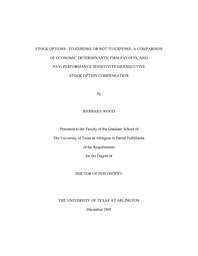
ATTENTION: The works hosted here are being migrated to a new repository that will consolidate resources, improve discoverability, and better show UTA's research impact on the global community. We will update authors as the migration progresses. Please see MavMatrix for more information.
Show simple item record
| dc.contributor.author | Wood, Barbara | en_US |
| dc.date.accessioned | 2007-08-23T01:56:03Z | |
| dc.date.available | 2007-08-23T01:56:03Z | |
| dc.date.issued | 2007-08-23T01:56:03Z | |
| dc.date.submitted | November 2005 | en_US |
| dc.identifier.other | DISS-1112 | en_US |
| dc.identifier.uri | http://hdl.handle.net/10106/99 | |
| dc.description.abstract | Until June 2005, firms had a choice in accounting for stock option compensation. The majority of firms elected to disclose option compensation expense in the footnotes of their financial statements. However, after the accounting scandals in the early 2000s, many firms moved from disclosing the expense to recognizing the expense as a charge against earnings. This research examines the reasons that firms would voluntarily elect to adopt option recognition prior to regulatory requirement. The decision to recognize option pay is examined with respect to efficient contracting, earnings management, and information signaling.
Firms that elect to expense option pay do so to reduce political costs and potential debt covenant violations. These firms also have greater earnings and lower option costs, reducing the impact of the recognition decision. From an information signaling perspective, firms with greater growth opportunities and greater insider ownership of the firm' stock use their recognition decision to reveal their firm's favorable prospects.
Examination of the use of option compensation by firms that voluntarily choose to expense option pay and firms that do not reveals that expensing firms are high quality firms that use option compensation more effectively. The payoff relationship between executive option pay and operating income shows diminishing returns for non-expensing firms and a linear relation for expensing firms, suggesting that non-expensing firms may be over-granting option pay. Additionally, the incentive value of CEO option grants for expensing firms is more closely aligned with shareholder interests than for non-expensing firms.
The economic determinants of executive option grants is similar for expensing and non-expensing firms. The residuals from the economic determinants model are used as an explanatory variable in a logistic regression model examining the decision to expense option compensation. Positive residuals indicate the firm grants options in excess of the level predicted by the economics determinants model. Firms over-granting option compensation would be less inclined to increase the transparency of their option program by moving the cost information into the firm's financial statements. The model shows that firms that over-grant executive stock options are less likely to voluntarily recognize option pay. | en_US |
| dc.description.sponsorship | Sarkar, Salil | en_US |
| dc.language.iso | EN | en_US |
| dc.publisher | Finance & Real Estate | en_US |
| dc.title | Stock Options: To Expense Or Not To Expense. A Comparison Of Economic Determinants, Firm Payoffs, And Pay-performance Sensitivity Of Executive Stock Option Compensation | en_US |
| dc.type | Ph.D. | en_US |
| dc.contributor.committeeChair | Sarkar, Salil | en_US |
| dc.degree.department | Finance & Real Estate | en_US |
| dc.degree.discipline | Finance & Real Estate | en_US |
| dc.degree.grantor | University of Texas at Arlington | en_US |
| dc.degree.level | doctoral | en_US |
| dc.degree.name | Ph.D. | en_US |
| dc.identifier.externalLink | https://www.uta.edu/ra/real/editprofile.php?onlyview=1&pid=617 | |
| dc.identifier.externalLinkDescription | Link to Research Profiles | |
Files in this item
- Name:
- umi-uta-1112.pdf
- Size:
- 717.6Kb
- Format:
- PDF
This item appears in the following Collection(s)
Show simple item record


